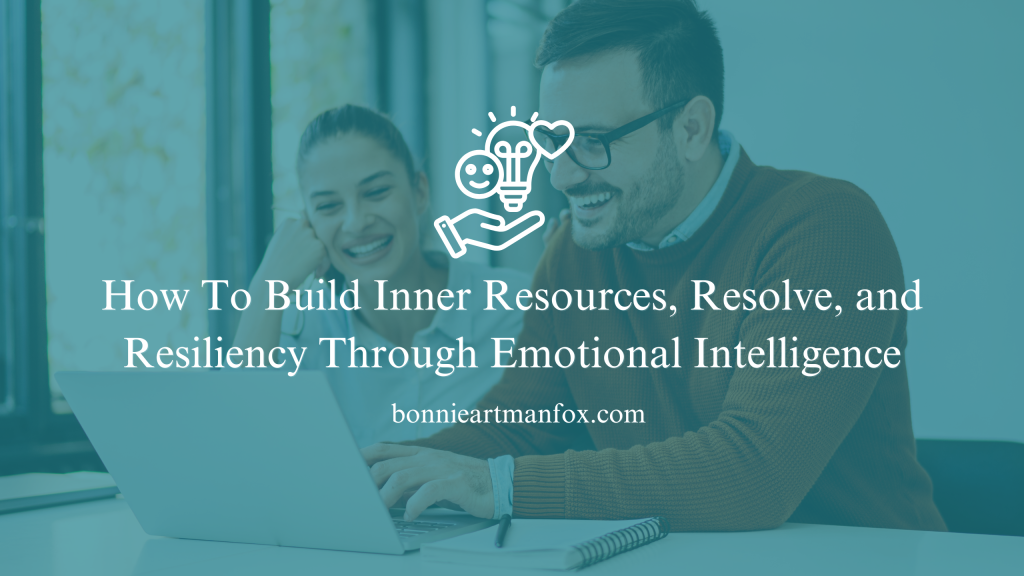
How To Build Inner Resources, Resolve, and Resiliency Through Emotional Intelligence
What inner resources, resolve, and resiliency will help you cope with demands, distractions, and disappointments at work?
During one of my workshops, I asked managers to share their experiences with the challenges they face in today’s workplace. Their answers revealed the emotional toll of unresolved organizational conflict:
“We are expected to do more in less time.”
“I hold everything inside – I don’t sleep, I’m constantly on edge.”
“I work 12 hours a day and still don’t get everything done.”
The room was filled with tension, anger, and silent stares.
These managers were caught in organizational change they didn’t create and didn’t agree with. This isn’t
just about stress, it’s about conflict between leadership expectations and employee capacity, between what’s being asked and what’s sustainable.
Their leader acknowledged the stress, then said: “This is just how it is. If the expectations aren’t a fit, it’s OK to move on. If you stay, you need to be all in.”
What’s missing is emotional intelligence in leadership.
Leaders who skip genuine acknowledgement and jump to “deal with it” create more conflict and resistance. Emotional intelligence doesn’t mean eliminating tough realities, it means helping people navigate them without burning out.
Your Freedom to Choose
October is Emotional Intelligence Awareness Month. While you can’t always control your circumstances or your leader’s emotional intelligence, you can develop your own.
Developing your inner resources through emotional intelligence enhances your ability to navigate workplace conflict. You become less reactive, more grounded, and able to engage difficult conversations with composure rather than defensiveness.
8 Emotional Intelligence Practices to Build Inner Resources, Resolve, and Resiliency
Research reveals that integrating intermittent practices of renewal into your day builds your capacity to handle challenges better. When you’re inundated with demands, practice one of these:
1. Redirect your thoughts to what is going well. Instead of replaying that heated exchange, ask: What did I handle well? What can I do differently next time?
2. Remind yourself of your efforts and strengths. Even if the other person wasn’t receptive, you did the right thing. That matters.
3. Read something inspirational. When you’re in the thick of workplace tension, inspiration reminds you of your capacity to handle hard things.
4. Record what you are grateful for. Gratitude doesn’t erase conflict, but it prevents conflict from erasing everything else.
5. Resolve to take care of yourself. Self-regulation requires that you manage your energy, not just your time.
6. Pause for 45 seconds after something positive happens. By dwelling on the positive, you decrease stress hormones and rewire your brain with resilience.
7. Reach out to people who give you genuine support. When you process emotions outside of work, you’re less likely to bring unprocessed frustration into workplace interactions.
8. Maintain humor without becoming cynical. Humor rooted in resilience, not bitterness, keeps you human in difficult times.
The Bottom Line
These aren’t coping mechanisms, they’re emotional intelligence skills that strengthen your ability to handle workplace conflict and stress.
This Emotional Intelligence Awareness Month, remember: developing Inner resources makes you more effective at navigating conflict, more resilient in the face of unrealistic demands, and more grounded when everything feels chaotic.
Make the conscious choice to build your inner resources through emotional intelligence, and you will face demands, distractions, and disappointments with more resolve and resilience.
To your resilience and resolve,
Bonnie
About the author

Bonnie Artman Fox, MS, LMFT works with executive leaders who want to gain self-awareness about the impact of their words and actions and up-level their interpersonal skills.
Drawing from decades as a psychiatric nurse and licensed family therapist, Bonnie brings a unique perspective to equip executive leaders with the roadmap to emotional intelligence that brings teams together.
Bonnie’s leadership Turnaround coaching program has an 82% success rate in guiding leaders to replace abrasive behavior with tact, empathy, and consideration of others. The end result is a happy, healthy, and profitable workplace…sooner vs. later.
